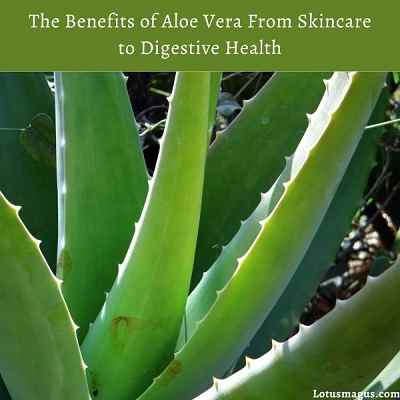Introduction
As someone who seeks out natural remedies for many of my health needs, I have found aloe vera to be a reliable and beneficial plant to add to my arsenal. It has a range of uses, including skin care, haircare, and digestive health. I want to share what I have found out about aloe vera’s many benefits in this article.
Aloe is a succulent plant with origins dating back thousands of years. It has long been used to treat various skin irritations and ailments and today it is widely used in the cosmetic industry for making lotions, creams, cleansers and other related products. Aloe contains active substances including polysaccharides, salicylic acid and other enzymes that make it an effective remedy against acne, sunburns, psoriasis and infection caused by bacteria or fungi. Furthermore, its antibacterial properties can help rid the scalp of dandruff as well as treat scalp itchiness or flakiness that can be caused by dryness or irritation.
Aside from skincare benefits, aloe has been widely studied for its potential healing properties in relation to digestive ailments like constipation. Its laxative properties can help increase the production of water in the intestines so food wastes will move more efficiently through the body. Aloe juice taken internally can also show positive results in treating inflammation due to ulcerative colitis or Crohn’s Disease while aloe latex offers relief from constipation without unnatural laxatives containing stimulants like senna leaf extract or castor oil which cause cramping due to their harsh ingredients.
In conclusion, aloe vera offers a range of potential benefits beyond skincare applications when consumed internally or applied externally as part of your regular health routine!
Skin Benefits
As someone who has battled with skin-related issues such as dryness, I have found that aloe vera is an excellent addition to my skincare routine. Whether I’m dealing with sunburn, dryness, or even an acne flare-up, aloe vera can help soothe and repair my skin. In this article, I’m going to talk about the skincare benefits of aloe vera, how to use it on your skin, and other tips for getting the most out of this natural remedy.

Hydration
As our skin is exposed to pollutants, poor habits and a variety of environmental factors, it can become dry and flaky. But the aloe vera plant has long been revered for its ability to give skin a natural boost of hydration and combat dryness.
The plant is made up of more than 99% water, so it’s no surprise that applying aloe vera directly on the surface of our skin can help us restore lost moisture. Rich in antioxidants like beta-carotene and vitamins C and E, aloe vera helps to protect our skin from further damage from free radicals like pollution. Aloe vera is also rich in magnesium, zinc and potassium – all ingredients that help your skin maintain its natural moisture balance.
Applying an aloe vera-based cream or serum after cleansing can leave your skin feeling fresh, plump and hydrated.
Treats Sunburns
As a sun-worshipper and outdoor enthusiast, I’ve experienced my share of painful sunburns in my lifetime. I used to apply lotions and creams that promised to relieve pain and inflammation, but nothing gave me the soothing relief I desired. That is, until I tried aloe vera gel straight from the plant!
The cool gel provided cooling relief right away. Not only did it help diminish the burning sensation and redness associated with sunburns quickly, but it kept me hydrated as well – something traditional lotions could not do. In addition to its fast-acting cooling benefits, aloe vera is packed with vitamins E & C which help promote healing and keep skin soft. Whenever my skin has been exposed to too much sun or wind for too long, aloe vera is what I turn to for immediate relief!
Reduces Acne
When it comes to keeping my skin looking its best, aloe vera is my go-to product. It can be used for a variety of skincare needs, including reducing the appearance of acne. Aloe vera is a natural anti-inflammatory that helps to reduce redness and swelling due to acne and other skin irritations. It’s also high in antioxidants and fatty acids, which help to soothe irritated skin.
The gel has antimicrobial properties that help clear out clogged pores and reduce the risk of further breakouts. I also find that when I apply it directly to active acne spots, they tend to heal faster and more effectively than using other treatments. In addition, aloe vera gel fights bacteria associated with acne while moisturizing the skin without making it oily or greasy.

Hair Benefits
As someone with a passion for natural beauty solutions, one of the many benefits of Aloe Vera is its potential to help with hair health. Aloe Vera is nutrient dense and, when paired with other natural ingredients, it may help fortify and nourish the hair. Additionally, its anti-inflammatory properties can help with itchiness, flakiness, and scalp sensitivity.
Let’s look into Aloe Vera for hair care in more detail.
Improves Scalp Health
I love the many benefits of aloe vera for the scalp. Applied directly to the scalp, aloe vera provides a cooling effect and hydration to dry, itchy scalp, which can help reduce dandruff. As an antibacterial and antifungal agent, it has also been shown to help soothe an irritant scalp caused by infections or build-up from fungus or bacteria.
Furthermore, aloe vera contains enzymes that can break down dead skin cells on both the scalp and hair shafts to unclog pores and reduce sebum buildup on your hair follicles – allowing your hair to look softer, shinier, and healthier!
Strengthens Hair

Aloe vera functions as an excellent hair strengthening tool, for both the scalp and hair. As an astringent, it helps to close the pores of the scalp and reduce dandruff and buildup, resulting in shiny healthy hair. It also has nutrient rich benefits that encourage cell regeneration, which can promote faster growth and stronger follicles while warding off hair loss.
I apply aloe vera gel directly to my scalp or mix it into my shampoo to get even distribution throughout my strands. Combining aloe vera with coconut oil is great for anti-dandruff application, while adding egg whites can help to reduce frizz. With its strong moisturizing abilities and anti-inflammatory properties, aloe vera is a great blade; I even use pure aloe gel as a detangling agent when needed!
Other benefits of using aloe vera on your hair include:
- Conditioning your scalp by preventing excess oil production.
- Treating redness or irritation on your skin from head scarves or wearing certain hairstyles.
- Balancing out pH levels.
- Being an all-natural humectant to draw in moisture.
- Nourishing hair cuticles for improved elasticity and breakage protection.
- Reducing itchiness or creating shine – all without weighing down your locks.
Reduces Hair Loss

I have been using Aloe Vera on my hair for a while now and I can confirm that it has helped to reduce hair loss. In fact, research has shown that Aloe Vera contains enzymes which help to lower the levels of DHT (dihydrotesterone) in the scalp. DHT is a hormone derivative associated with male-pattern baldness and can decrease the production of melanin, the pigment responsible for your hair color, which can lead to premature graying and balding.
Aloe Vera is also high in minerals like zinc, iron and magnesium which are important for healthy hair growth. Zinc helps to produce new cells in the scalp and stimulates circulation of blood from head to toe while magnesium helps with stress relief by releasing calming hormones – an important factor as stress contributes to early aging and weakened immune systems. Iron is essential as it transports oxygen throughout our body, including our hairs’ roots; it aids in repair of tissues cells, boosts cell reproduction and promotes healthier growth. By keeping our scalps hydrated, enriched with essential vitamins & minerals, hair loss can be reduced significantly when Aloe Vera is used regularly.
Digestive Health Benefits
As someone who struggles with digestive issues, I’ve been looking for natural remedies to help with my symptoms. I recently discovered that aloe vera offers many digestive health benefits. Aloe vera is widely known for its skincare benefits, but it’s also incredibly beneficial for digestive health.
In this article, I’m going to discuss the digestive health benefits of aloe vera and how it can help to alleviate common digestive issues.
Reduces Inflammation
As an anti-inflammatory agent, Aloe Vera has been known to reduce inflammation in the digestive system. This, in turn, can help with numerous digestive issues ranging from acid reflux and irritable bowel syndrome to chronic constipation or diarrhoea.
Aloe Vera is also a rich source of enzymes that help break down proteins and carbohydrates into simpler components for easier digestion. Thanks to its natural properties, Aloe Vera has been used for centuries as an ingredient in traditional Thai and Chinese medicines for treating problems related to stomach ailments and acidity.
Not only does it reduce inflammation, but it also helps balance the pH level in the stomach which prevents gas formation and burning sensation inside the intestines.
Aids Digestion
For centuries, aloe vera has been used internally to aid digestion. Studies have looked at the effects of drinking aloe on constipation, inflammatory bowel disease, ulcers and more. One of the key digestive benefits of aloe vera is its ability to act as a mild laxative, providing relief from constipation. This is due to its high content of mucilage (the thick, clear substance that lines the interior surface of leaves). Mucilage is known for its ability to draw water into the intestines and soften stools.
Aloe’s anti-inflammatory properties have been found to be helpful in treating inflammatory conditions such as Crohn’s Disease and irritable bowel syndrome (IBS). Several studies have indicated that taking aloe gel or juice can reduce symptoms such as abdominal cramps, bloating, diarrhea and flatulence associated with IBS and other digestive disorders. In addition, some studies show that taking aloe may reduce ulcer size associated with Helicobacter pylori (H. pylori) infection – a type of bacterial infection present in as many as half of all people worldwide.
The benefits of aloe for digestive health make it an excellent addition to your daily routine. If you feel like your gut could use a boost, why not give it a try?
Improves Gut Health
As well as being a wonderful skin moisturizer and anti-inflammatory agent, I have also seen how aloe vera can improve gut health. It contains over 200 active components including polysaccharides, enzymes, vitamins, minerals and organic acids which can help promote digestion and reduce digestive upset. Many of these compounds work together to soothe the irritated lining of the intestines and detoxify the system of any harmful substances.
Aloe vera also contains extremely high levels of dietary fiber which helps to keep your digestive tract regular and improves bowel transit time. Studies have shown that dietary fiber in aloe vera helps reduce lipid levels in the blood – an important factor for maintaining good overall health. It can help with anything from occasional constipation to signs of irritable bowel syndrome (IBS), including abdominal pain, cramping or bloating.
Enzymes in aloe vera are also known to be beneficial for digestion: they act as catalysts in digestion by breaking down proteins, carbohydrates, fats and fiber into simpler forms that can then be more easily absorbed by your body. Further studies have shown that consuming certain enzymes present in aloe vera helps to enhance nutrient absorption while promoting healthy intestinal bacteria.
Conclusion
In conclusion, incorporating Aloe Vera into your daily routine can provide numerous positive health benefits. Its natural healing properties make it a great topical skincare remedy to relieve symptoms of irritation and inflammation, while its high levels of vitamins, minerals, and antioxidants help with your overall digestive health. Aloe Vera is safe for all genders; adding the plant-based product to your regular self-care regime may help make you feel healthier both inside and out.
It’s important to remember that everyone is different and results may vary. Always discuss any big changes to your daily routine with a doctor or healthcare professional first.
Related Posts:
Why Your Aloe Plant Fell Apart: Overwatering and How to Fix It
How To Fix An Overwatered Aloe Plant: Pictures, Watering Schedule
The Benefits of Aloe Vera From Skincare to Digestive Health
How to Harvest and Use Aloe Vera Gel A Step by Step Guide
A Beginners Guide to Growing Aloe Vera Tips and Tricks for Success
The History and Folklore of Aloe Vera Myths Legends and Cultural Significance
Is Aloe Vera Flower Luck? – Know The Reason Behind It
Aloe Vera Meaning (What Does It Symbolize Spiritually In Different Cultures?)
Aloe Vera Flowers Uses and Medicinal Benefits
What To Do When Aloe is Flowering? 5 Ways to Keep Blooming
Aloe Vera Plant Care – 5 Tips to Grow Them Indoors
Can You Freeze Aloe Vera Plant – Store and Preserve Gel, Leaf
Aloe Vera Plant Varieties Pictures ( Capitata var. quartziticola, Crosby’s prolific)
Leggy Aloe Vera – Stem Too Long(How to Fix), Repotting Plant
Plants that Look Like Aloe Vera – 7 Similar Succulent(Pictures)
Aloe Vera Flower: What to do, How often It Bloom? Care, Grow (uk)
